Table of Contents
- Meet Tiara Kinnebrew
- Interview with Carla Denise Byrd
- Meet Jay Delnegro
- Interview with Racquel Miller
- Interview with Marguerite Copeland
- Interview with Cherese Douglas
- Interview with Kirsten Campbell
- Interview with Austen Brantley
- Meet Deka Henry
- Casta: The Origins of Caste by Yıldız Öztürk
- Meet Kiera Rahming-Reed
- Interview with Ofobuike Okudoh
- Thread My Needle by Erik La Prade
- Meet Vaniza Pierre
- Meet Keadra Jeter
- Interview with Dany Green
- Meet Kendra Monice Hansford
- Meet Karin Bond
- Meet Tomiwa Adelagun
- Interview with Charmaine French
- Interview with Elisha Nyong
Interview with Elisha Nyong
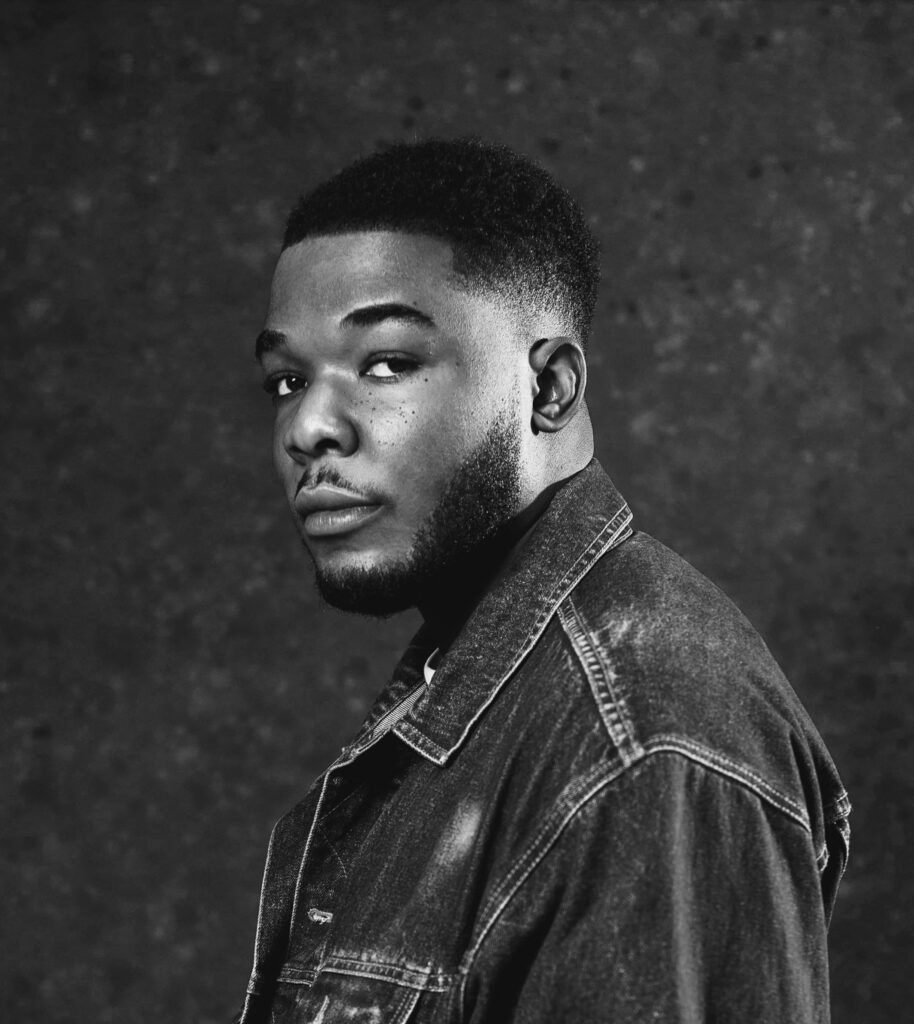
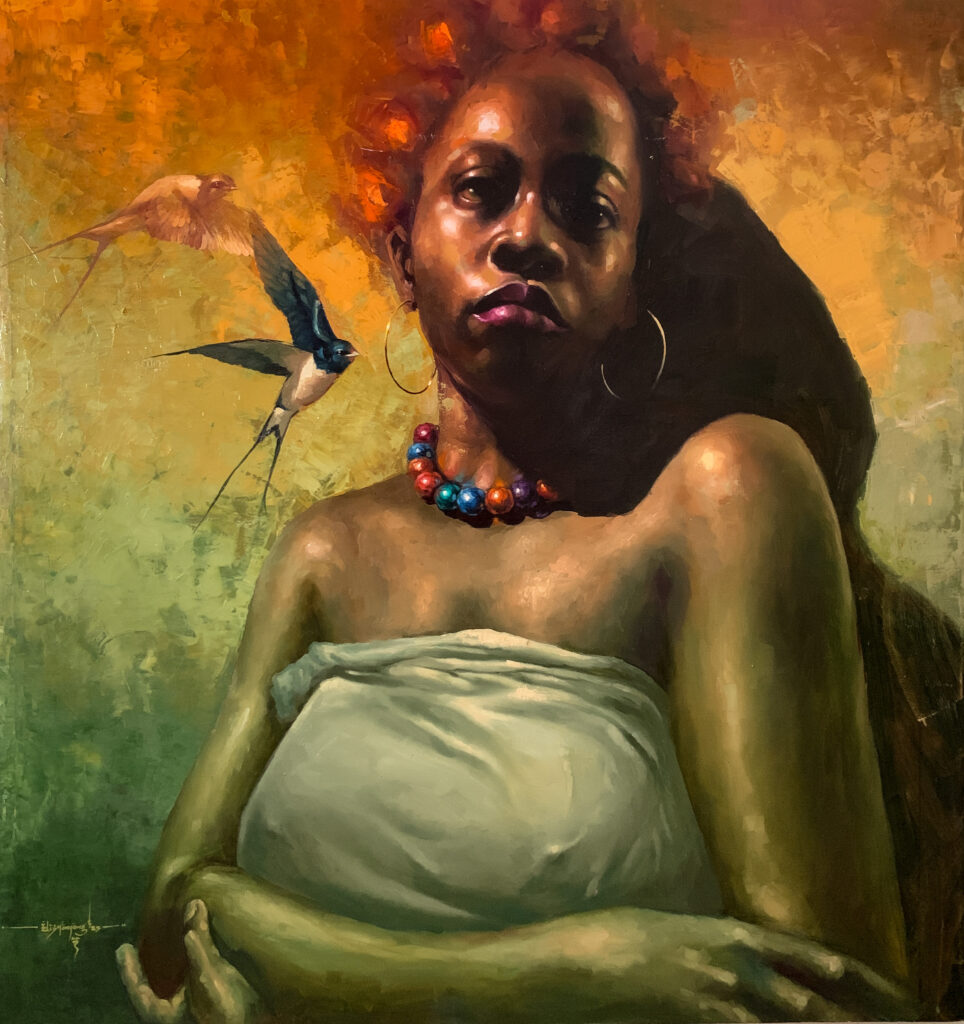
Elisha Nyong, Catatonic, 2023, Oil on Canvas
Elisha Nyong is a young contemporary Nigerian artist who has been practicing art for less than a decade; his works are centered around questions about the nature of being, controversial issues, and existential dilemmas like religion, death, and mental health among others.
He has completed a number of projects and has participated in exhibitions internationally with his latest titled “BLACK HEROINE” in Harlem, NYC; to mark the opening of the Òmìnira: Art and Tea Gallery. He is represented by Òmìnira: Art and Tea Gallery, Constance and Sons Gallery.
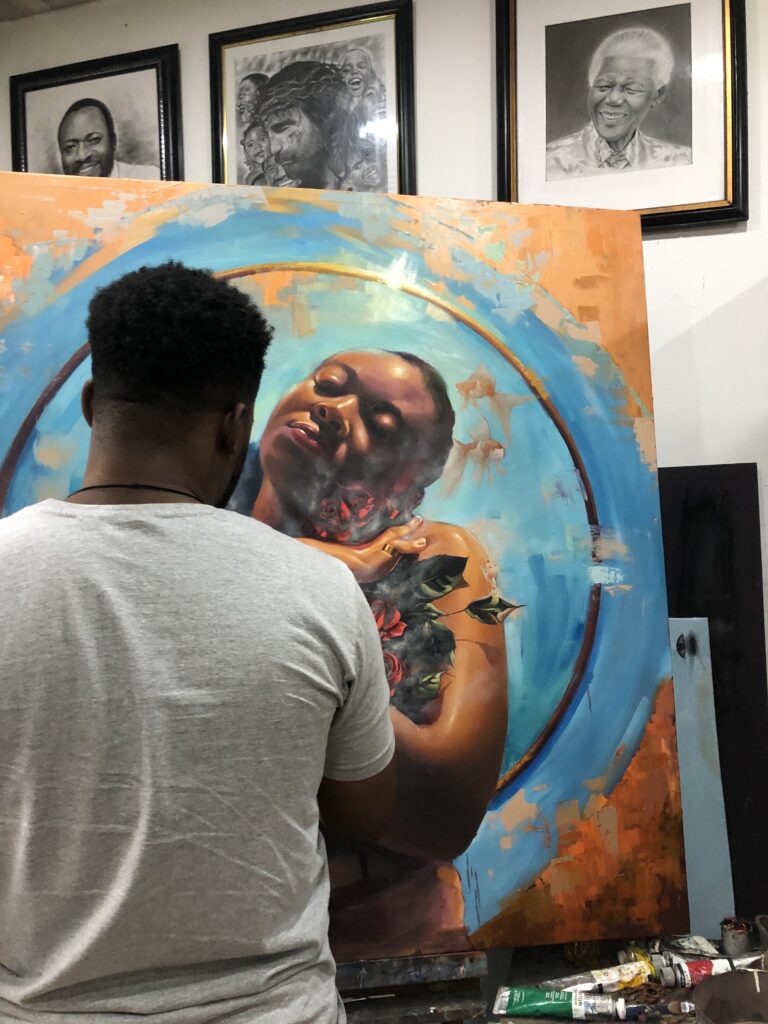
Elisha Nyong, Echoes of a Dream, 2022, Oil on Canvas
“.. demystifying the mysteries of existentialism is the core of Art praxis. The unique themes of my visual allegories are a clarion call to seek out and assimilate a world beyond the three-dimensional plane; it is a letter so long I’ve barely begun…”
Read our interview below to get a glimpse into Elisha Nyong’s creative journey.
What do you mean by, “Demystifying the mysteries of existentialism is the core of my art praxis”? How is this conveyed in your work?
Astrophysicists tell us the Universe is riddled by energy and frequency. I believe everything tells a story because everything has a history; in our superficially wired nature, we don’t fine-tune into these cosmic frequencies and energies so we miss them.
As an artist, I am teaching myself to understand these frequencies, tap into these energies even if just the vestiges; and interpret them in what way I best can. I tell stories and interpret the memories of the world, visually through media in Fine Art.
What made you take the leap to build a creative brand?
Honestly, I’ve never been commerce-oriented nor do I have the rudimentary aptitude for brand building. My idea about seeding my talent came after I read The Artist Way by Julia Cameron and Mark Bryan; I realized that we can’t exactly offer thanks to the universe for our gifts but we can be appreciative by honing our skills. That’s the only way we appreciate Providence.
So appreciating a generous Universe and giving purpose to my existence and practice are some of the reasons why I have branded myself an artist today.
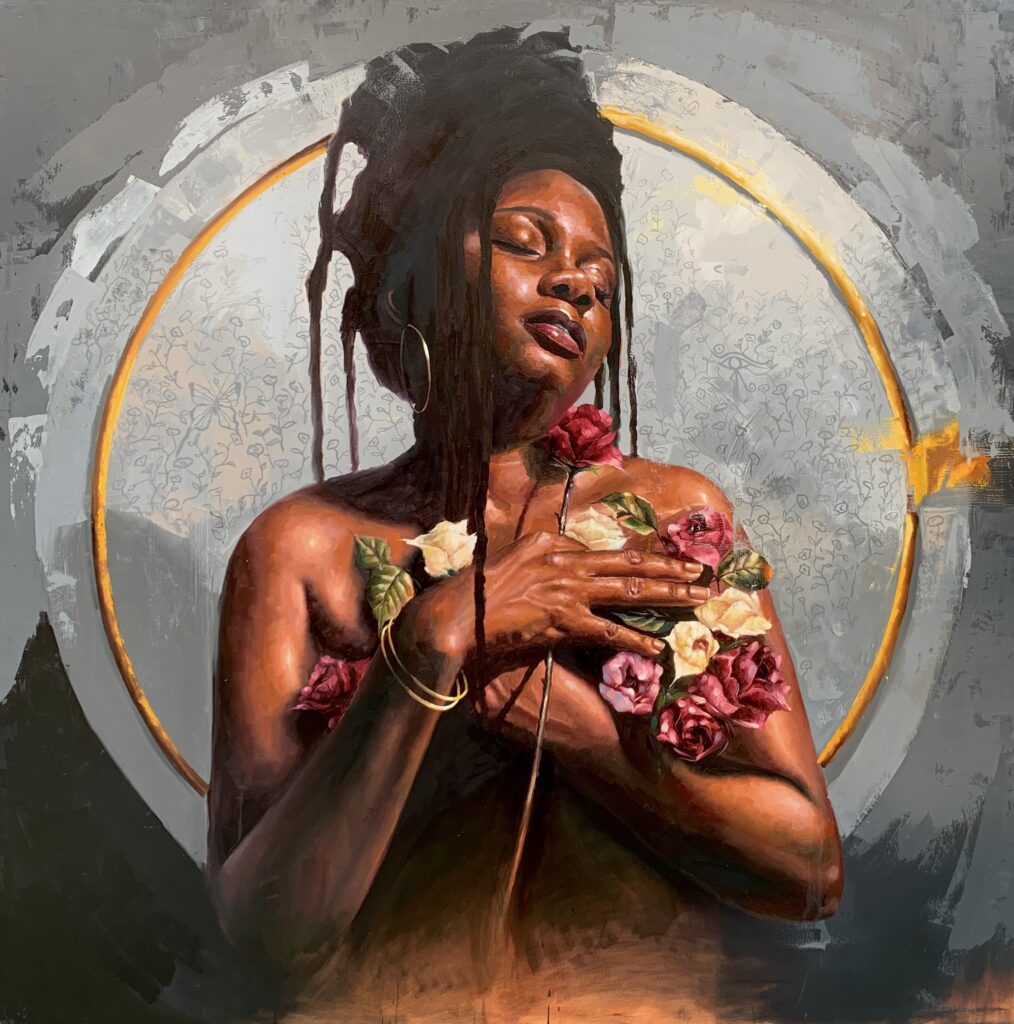
Elisha Nyong, Dark Paradise, 2023, Oil on Canvas
How do you work and how has your practice changed over time?
In 2018, I co-authored a paper on unlocking the creative-self by engaging creativity through the subconscious; that’s how I create. Whatever the conscious, sober mind has to say is mostly noise, riddled with superstitions, taboos and a whole bunch of make-beliefs. But creativity from the subconscious is pure energy and I draw inspiration from it. Over time, my works may have changed physically but I engage my creative process in the same way; my metaphors are still as surreal as from six years ago.
How do you define success as an artist? What do you wish to accomplish?
Amir Khan quoted, “Follow excellence and success will come running after you pants down…” The things I care about most as an artist are aptitude and excellence. Being closely knitted to the practices of the old masters, I categorize success as achieving consistency and experiencing transcendence within you. It is true, compared to a fat bank account or just pure luck; I wish to achieve a level where I’m not churning out art like a mechanized art tool but I produce real masterpieces that evoke discourses within and outside the creative sphere. I want to accomplish creating art that not only has my signature on it but conveys my true essence as a creative artist along it.
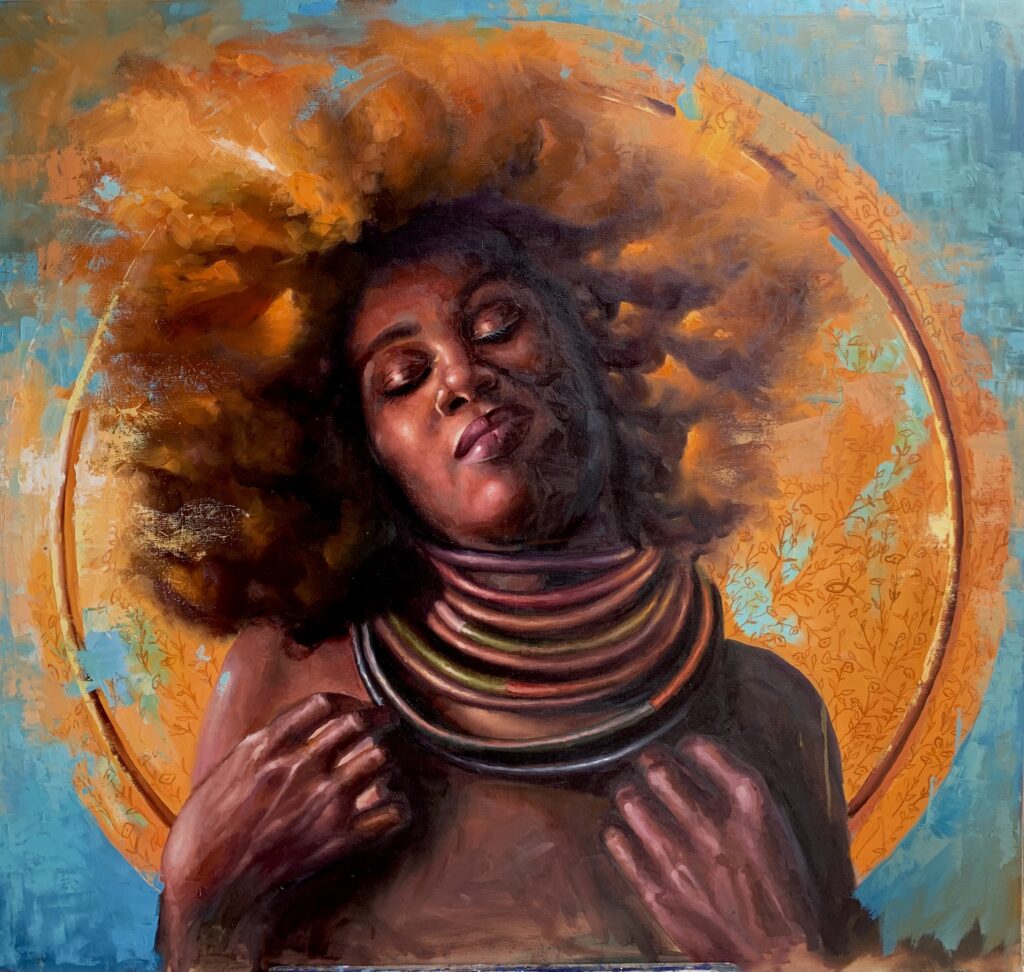
Elisha Nyong, Psychic Fallout, 2023, Oil on Canvas
What does being a Black artist mean to you?
“…not by the color of their skin but by the content of their character…” The language of art is universal, it’s not racial or ethnic-based; the concept of Black or Caucasian artists is just sentiments like the camouflage of a chameleon – without any true substance. Like activism, art shouldn’t be ethnic or race-bound, it should speak collectivism globally.
But for the sake of just indulging, being a Black artist to me would mean I’m of African descent; making and recording visual allegories for a global audience without any bigotry whatsoever.
How did you learn the skills to create? Did you take art classes or are you self-taught?
I am a graduate of Fine and Industrial Arts; taking away the academic tutelage, I am self-taught. I’ve never been under the supervision of any master; I developed and maintained my painting skills, studied, and developed color theory all by my lonesome. I think a lot of artists out there can attest to how “useful” Nigerian University professors are in helping you hone your artistic potential.
In your journey as an artist, what has been the most unexpected experience, realization, or challenge?
First, it was the realization that consistency counts more than everything else; more than hard work, more than talent, even more than skill. Success is just that “consequence” of showing up every day.
Next, that being an artist doesn’t come with a manual. There’s no reason as to what style or techniques you should choose, to what media you’d want to explore, among others.
Finally, I found that color theory is exactly a theory; it is non-definitive. Your palette can be shaped and tweaked into anything you set your mind to and it will be made manifest.
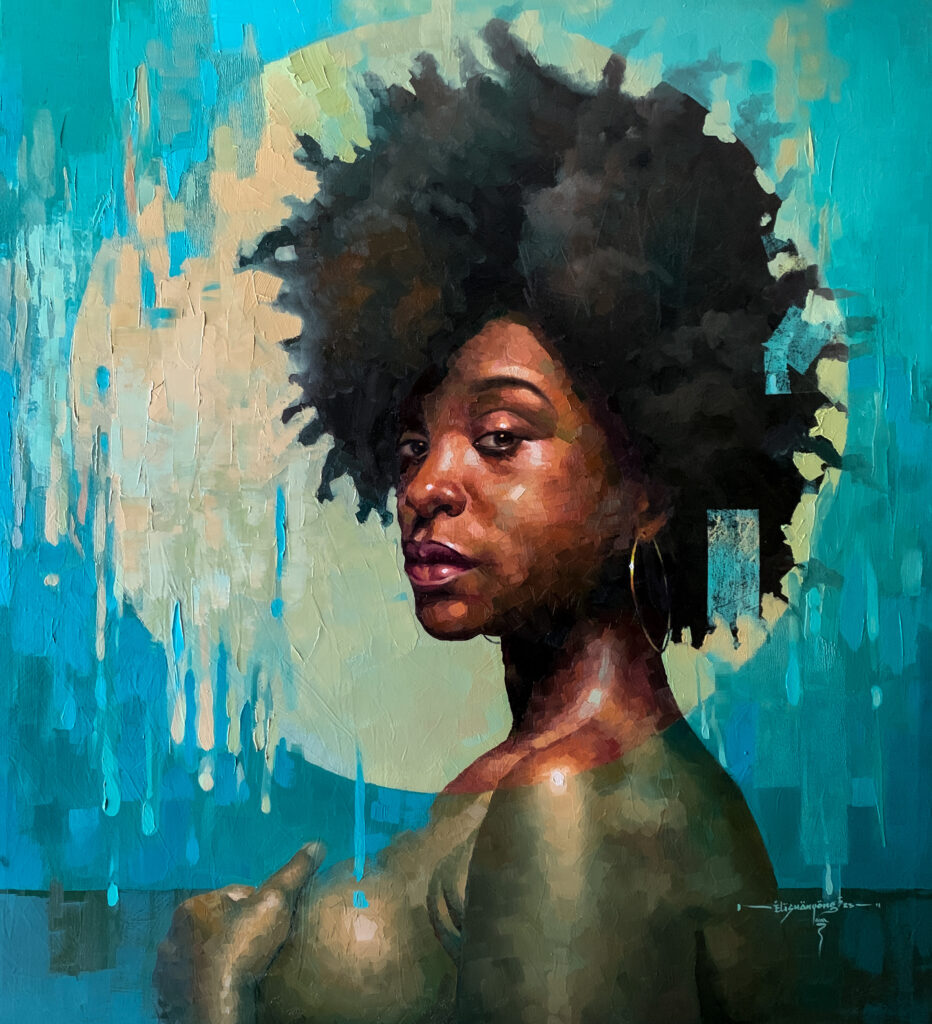
Elisha Nyong, Boulevard of Broken Dreams II, 2023, Oil on Canvasvard of Broken Dreams II
What is your biggest barrier to being an artist? How do you address it?
I think the most important barrier I’ve faced as an artist was not understanding the commerce of the art industry, not knowing how to leverage skill and prove consistency to clients and collectors.
Growing up I thought I just needed to paint and the clients and collectors would find me, but not having someone teach me how to establish a clientele and build a presence among collectors set me back a few years. I’m glad watching podcasts and listening to other experienced minds in the field like Victor Ekpuk talk about things helped me cut a few corners in good enough time.
Is there anything missing within our Black art communities?
There are amazing Black artists out there, but if I’m to talk about the Nigerian art space, I foresee a trend of creatives who could lose originality in little time to come. Maybe, they’re just taking Plato’s “Art is an imitation” theory to heart in the extreme.
Globally, I don’t think the Black art community needs any more. The sense of community and truth to purpose has grown exponentially among Black artists and it is something to be admired. Can we do better? Absolutely. But the path we’re on is without a doubt, apt.
Artist Contact Info
Instagram: @elishanyong
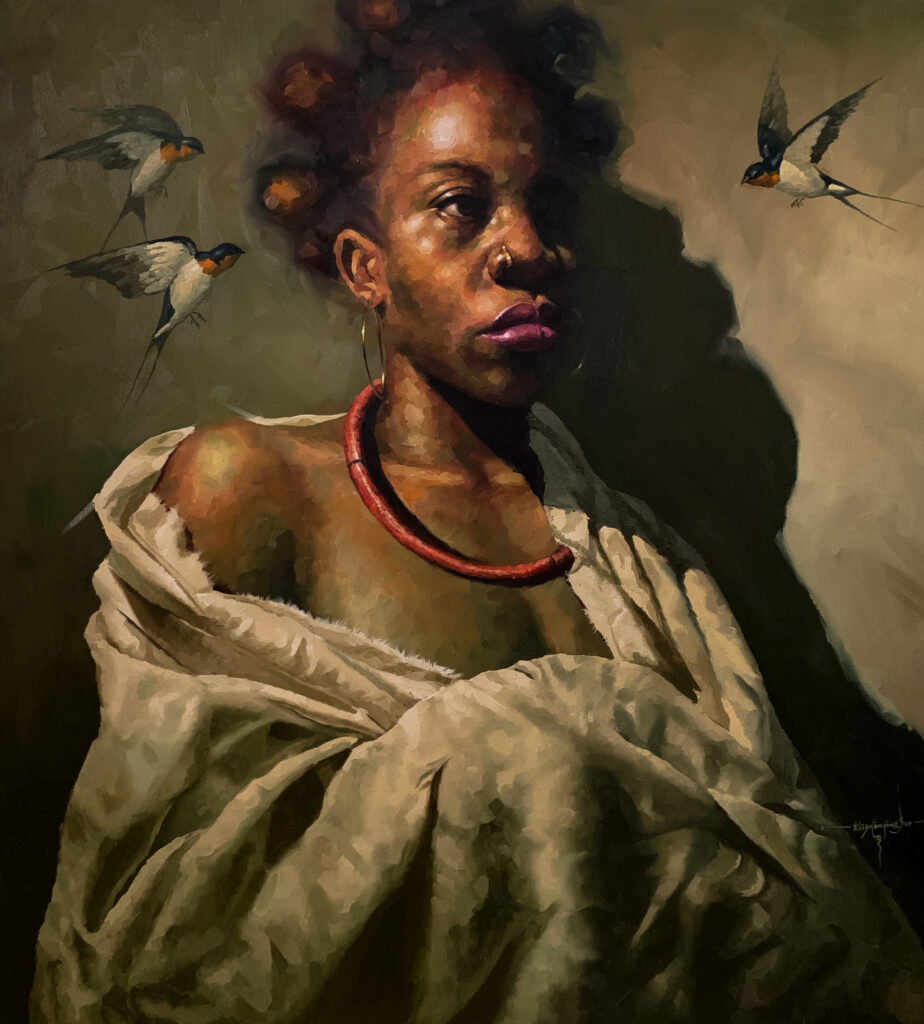
Elisha Nyong, Catatonic II, 2023, Oil on Canvas